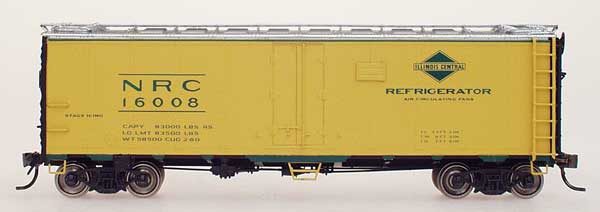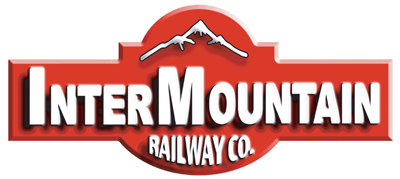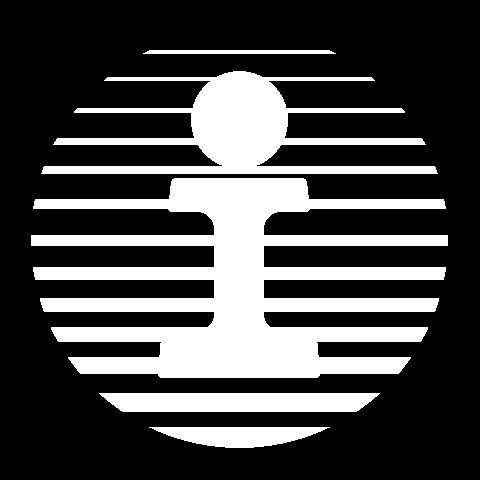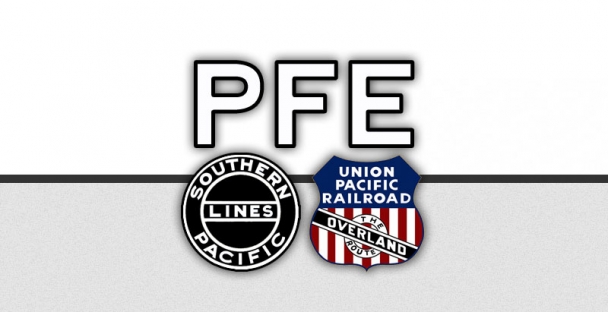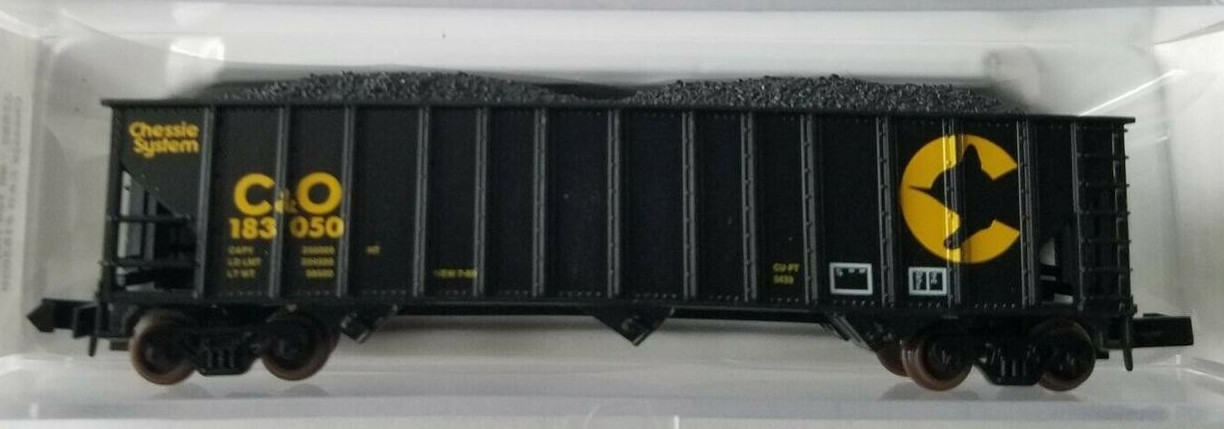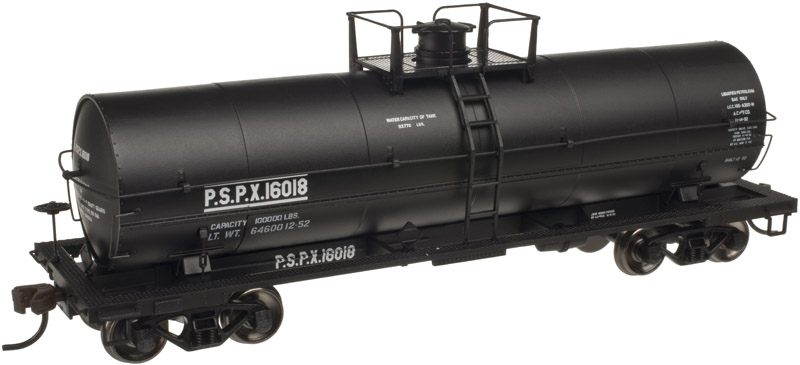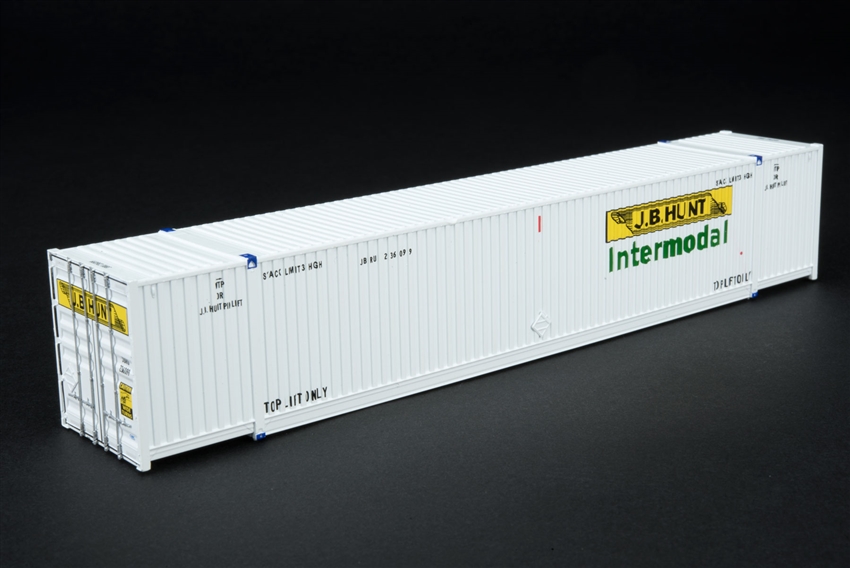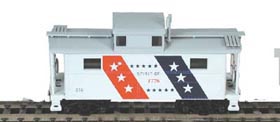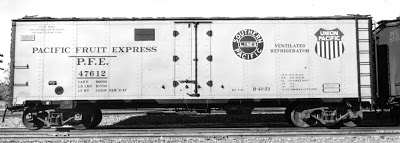Model Information: This model was first produced in the 1990s by InterMountain and was originally only available as a kit. More recent releases are only available as RTR (Ready-to-Run) models. It is a very nicely detailed and even after 20 years in production, it remains one of the best N Scale reefer models available. This is likely due to the fact that it was originally available only as a kit that it has so many fine detail parts such as the intricate handrails. My guess is that InterMountain simply didn't worry about the cost of the assembly as they were shipping them assembled. Hence they have far more detail than similar models from Atlas or Micro-Trains.
In addition the the numerous paint schemes, InterMountain has produced a large number of special runs, with some particularly attractive examples produced for YesterYear. Over the years, the couplers supplied with this model have varied a lot. The original release featured dummy knuckle couplers, but I have also seen examples with Micro-Trains couplers, Accumate couplers and Micro-Trains knockoffs.
In addition the the numerous paint schemes, InterMountain has produced a large number of special runs, with some particularly attractive examples produced for YesterYear. Over the years, the couplers supplied with this model have varied a lot. The original release featured dummy knuckle couplers, but I have also seen examples with Micro-Trains couplers, Accumate couplers and Micro-Trains knockoffs.
Prototype History: PFE built the Class R-40-23 steel ice-cooled refrigerator car in 1947. This was the largest class of steel cars they built. In this version, the placard board was moved to the left of the car door and a little higher, and the smaller board seen on Class R-40-20 was omitted. And once again, the route card board was applied at the left bolster.
These cars feature Murphy steel roofs, W-corner 3/3 Improved Dreadnaught ends and 4'-0" doors. A group of 1000 cars was converted for Temco service and renumbered 20002-21001 in 1960-61. Another group of 15 cars was rebuilt with 6' plug doors for Polarstream Liquid Nitrogen cooling and renumbered 1001-1015 in 1965. Another group of 239 cars was renumbered into the 36001-36500 series for TIV service in 1965-66. The Temco equipped cars had it removed in 1966 and were renumbered to 35002-36000. The cars 1001-1015 were renumbered 36501-36515 for TIV service in 1968.
These cars feature Murphy steel roofs, W-corner 3/3 Improved Dreadnaught ends and 4'-0" doors. A group of 1000 cars was converted for Temco service and renumbered 20002-21001 in 1960-61. Another group of 15 cars was rebuilt with 6' plug doors for Polarstream Liquid Nitrogen cooling and renumbered 1001-1015 in 1965. Another group of 239 cars was renumbered into the 36001-36500 series for TIV service in 1965-66. The Temco equipped cars had it removed in 1966 and were renumbered to 35002-36000. The cars 1001-1015 were renumbered 36501-36515 for TIV service in 1968.
Road Name History: The Illinois Central Railroad (reporting mark IC), sometimes called the Main Line of Mid-America, was a railroad in the central United States, with its primary routes connecting Chicago, Illinois, with New Orleans, Louisiana, and Mobile, Alabama. A line also connected Chicago with Sioux City, Iowa (1870). There was a significant branch to Omaha, Nebraska (1899), west of Fort Dodge, Iowa, and another branch reaching Sioux Falls, South Dakota (1877), starting from Cherokee, Iowa. The Sioux Falls branch has been abandoned in its entirety.
The IC is one of the early Class I railroads in the US. Its roots go back to abortive attempts by the Illinois General Assembly to charter a railroad linking the northern and southern parts of the state of Illinois. In 1850 U.S. President Millard Fillmore signed a land grant for the construction of the railroad, making the Illinois Central the first land-grant railroad in the United States.
The Illinois Central was chartered by the Illinois General Assembly on February 10, 1851. Senator Stephen Douglas and later President Abraham Lincoln were both Illinois Central men who lobbied for it. Douglas owned land near the terminal in Chicago. Lincoln was a lawyer for the railroad. Upon its completion in 1856 the IC was the longest railroad in the world. Its main line went from Cairo, Illinois, at the southern tip of the state, to Galena, in the northwest corner. A branch line went from Centralia, (named for the railroad) to the rapidly growing city of Chicago. In Chicago its tracks were laid along the shore of Lake Michigan and on an offshore causeway downtown, but land-filling and natural deposition have moved the present-day shore to the east.
In 1867 the Illinois Central extended its track into Iowa, and during the 1870s and 1880s the IC acquired and expanded railroads in the southern United States. IC lines crisscrossed the state of Mississippi and went as far as New Orleans, Louisiana, to the south and Louisville, Kentucky, in the east. In the 1880s, northern lines were built to Dodgeville, Wisconsin, Sioux Falls, South Dakota, and Omaha, Nebraska. Further expansion continued into the early twentieth century.
The Illinois Central, and the other "Harriman lines" owned by E.H. Harriman, was the target of the Illinois Central shopmen's strike of 1911. Although marked by violence and sabotage in the south, midwest, and western states, the strike was effectively over in a few months. The railroads simply hired replacements and withstood diminishing union pressure. The strike was eventually called off in 1915.
The IC is one of the early Class I railroads in the US. Its roots go back to abortive attempts by the Illinois General Assembly to charter a railroad linking the northern and southern parts of the state of Illinois. In 1850 U.S. President Millard Fillmore signed a land grant for the construction of the railroad, making the Illinois Central the first land-grant railroad in the United States.
The Illinois Central was chartered by the Illinois General Assembly on February 10, 1851. Senator Stephen Douglas and later President Abraham Lincoln were both Illinois Central men who lobbied for it. Douglas owned land near the terminal in Chicago. Lincoln was a lawyer for the railroad. Upon its completion in 1856 the IC was the longest railroad in the world. Its main line went from Cairo, Illinois, at the southern tip of the state, to Galena, in the northwest corner. A branch line went from Centralia, (named for the railroad) to the rapidly growing city of Chicago. In Chicago its tracks were laid along the shore of Lake Michigan and on an offshore causeway downtown, but land-filling and natural deposition have moved the present-day shore to the east.
In 1867 the Illinois Central extended its track into Iowa, and during the 1870s and 1880s the IC acquired and expanded railroads in the southern United States. IC lines crisscrossed the state of Mississippi and went as far as New Orleans, Louisiana, to the south and Louisville, Kentucky, in the east. In the 1880s, northern lines were built to Dodgeville, Wisconsin, Sioux Falls, South Dakota, and Omaha, Nebraska. Further expansion continued into the early twentieth century.
The Illinois Central, and the other "Harriman lines" owned by E.H. Harriman, was the target of the Illinois Central shopmen's strike of 1911. Although marked by violence and sabotage in the south, midwest, and western states, the strike was effectively over in a few months. The railroads simply hired replacements and withstood diminishing union pressure. The strike was eventually called off in 1915.
Brand/Importer Information: InterMountain was founded in 1985 by Fred Brummet. They got started in the model railroad business by producing O-Scale model kits. They got started in the N Scale business almost a decade later when in 1994 they introduced the 40-23 reefer car in kit form. Later, in 1998, they started producing RTR (Ready-to-Run) models. By the early 2000s, InterMountain phased out kit production in favor of the RTR models.
The InterMountain Railway company is located at 1224 Boston Ave in Longmont, CO. They are a manufacturer of HO, N and Z scale model trains. They have produced kits as well as RTR (Ready-To-Run) models. Their N Scale products include locomotives as well as rolling stock. Their rolling stock lineup includes Boxcars, Hoppers, Tank Cars, Reefers, Gondolas, Stock Cars and Flatcars.
Their locomotive releases have primarily been diesel units, with the one major exception being their series of AC-12 Cab Forward steam locos. Their diesel lineup includes F3's, F7's, F9's, SD40's, SD45's and FT units. They are known for quality and detail. They also release their rolling stock in larger varieties of road numbers than most of the other manufacturers.
The InterMountain Railway company is located at 1224 Boston Ave in Longmont, CO. They are a manufacturer of HO, N and Z scale model trains. They have produced kits as well as RTR (Ready-To-Run) models. Their N Scale products include locomotives as well as rolling stock. Their rolling stock lineup includes Boxcars, Hoppers, Tank Cars, Reefers, Gondolas, Stock Cars and Flatcars.
Their locomotive releases have primarily been diesel units, with the one major exception being their series of AC-12 Cab Forward steam locos. Their diesel lineup includes F3's, F7's, F9's, SD40's, SD45's and FT units. They are known for quality and detail. They also release their rolling stock in larger varieties of road numbers than most of the other manufacturers.
Item created by: CNW400 on 2021-04-26 13:04:14. Last edited by CNW400 on 2021-04-26 13:04:15
If you see errors or missing data in this entry, please feel free to log in and edit it. Anyone with a Gmail account can log in instantly.
If you see errors or missing data in this entry, please feel free to log in and edit it. Anyone with a Gmail account can log in instantly.


